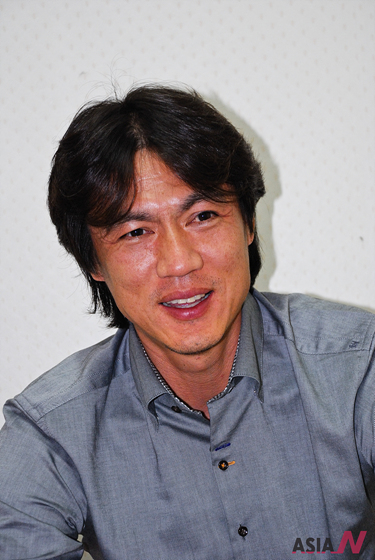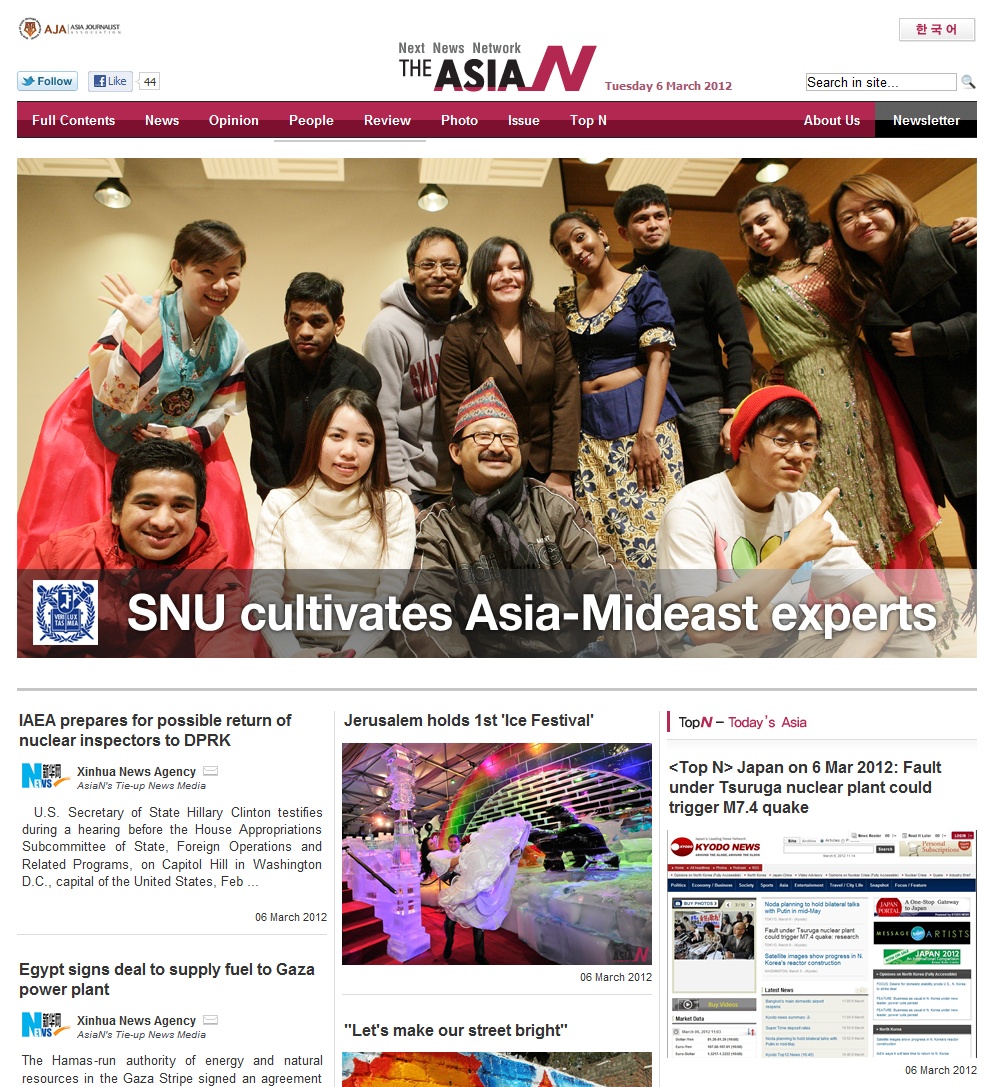“Don’t Just Run During Games but Look Around While Thinking”
Hong Myung Bo Coach’s Leadership, “Important to be Considerate of Players Who Don’t Get Playing Time”
Hong Myung Bo, the national team’s captain who determined Korea’s semi-final qualification for the 2002 Korea-Japan world cup with his penalty shoot-out. Now he stands as South Korea’s Olympic team head coach to recreate the legendary success of 10 years at the 2012 London Olympics. Although he has stepped foot on the world cup scene four consecutive times, he has never competed in the Olympic finals.
Coach Hong said ‘if you choose between being the best and trying your best, of course you choose trying your best’. Nevertheless, in the world of competition where one is evaluated by one’s results, he said he never wants to lose.
Coach Hong not only showed a movie to his players on the day before practice, but he also advised players who believed running hard on the field equals trying hard on the field to stop. Rather, he advised players to run while reading the game accurately. Coach Hong’s leadership is the integration of two words, ‘communication’ and ‘leading by example’.
-You are undergoing the qualifying rounds, what are your thoughts?
“It isn’t easy getting to the Olympics, but since it’s the goal that is required, I want to achieve it successfully. If the results are poor, the entire process of preparation is rated negatively as well. Although I wish results didn’t determine everything, the society we live in does not allow failure and I am a member of this society. Even if we fail, I want to be able to think that ‘I honestly have no regrets”.
-What is important as a coach?
“If a coach instructs players to do this and that, he can change the player’s thoughts. However, to become a truly good coach, I think one needs to change what’s in the player’s hearts. But changing one’s mind is extremely difficult. I’ve invested a lot of time to achieve it”.
-How do you change players’ hearts?
“I bring out matters like things player’s haven’t done until now or their underlying stresses, and here, the most important thing is communication. It is not the coach who orders every thing, but rather the coach suggests a topic and collects the many different thoughts of players. This can be something new that players have never experienced before..”
Coach Hong uses the expression “Gentlemen (everybody)” when he calls his players. He tries not to talk down to them by using “hey” or “you”.
-You don’t conform to the stereotypical image that sportsmen are handled roughly. Where have you learned to take such an approach?
“I learned from international instructors while I was the national team’s coach. Those instructors pay a lot of attention to their players and give them respect. No matter how minor, they discuss problems that concern their players. In Korea we are used to hearing the coach say “I talk and you just follow”. But these instructors even ask a player who has reddish eyes in the morning, “did you not sleep well last night”, “is something going on in your family”. I learned by watching such considerate behavior.
‘If you run like us, there is no team we cannot beat” But the running is our reason for losing
-If you communicate, your relationship might improve, but does it have anything to do with performance?
“Of course. The most important thing is to improve performance. I think it is because we added the component of communication on top of performance enhancement that we were able to more of an impact. Even in training, we’ve used methods that weren’t previously used before. The previous coaches said “run, run more”, but I say “isn’t it better to observe the game then to just run a lot?”, I tell them “widen your view”.
-There is a coach that tells players to stop running so much?
“Foreign coaches said that. ‘Korean players run needlessly too much. They even run when they shouldn’t be running’ Before an event like the World cup, the team trains tremendously. For a month we run the track every single day, with that much amount of training Korea should be unbeatable. But lack of stamina is always indicated as Korea’s weakness. Why is that we can’t run the last 15minutes of the second half and ultimately let goals in. It’s because we have too much superfluous movement. We aren’t moving efficiently during games.”
-What are you suppose see instead of running?
“Since I teach my players to stop running, people call me a weird coach. They ask what kind of coach am I. Players said they were praised by the previous coaches simply by running, if they don’t run, what do they do? They asked what they need to do to receive praise from the coach and I told them ‘let’s see’. You need to make accurate observations and make error-free judgments. That’s the kind of playing I’m looking for.”
-What do you value more, individual skill or teamwork?
“I fundamentally put a lot of weight on teamwork. In our society, communication is the current topic of conversation, but abroad, communication is a given. We are lacking what is a given for others. Things like the younger person not being able to open up to an elder player frustrated me. It’s not a matter of like or dislike, not being able to communication just doesn’t make sense. It disappoints me to see that communication is still an issue for us.”
The coach isn’t there for the actual battle. They are there to take responsibility.
In 2008, Coach Hong, with chief mountaineer Um Hong Gil and his then 11 year old son, climbed 4100ms of mount Everest. He uses captain Um’s leadership to illustrate his leadership style as a Olympic team head coach.
“Captain Um checks everything and leads from climb to descent, from start to finish. He is meticulous in checking whether everything is taken care of or not. Soccer coaches aren’t like that. At the most important moment, soccer coaches have no control. The only thing a coach can do at a game is substitute players. In the case of Captain Um, he focuses more intensely during the last 50m descent and brings everyone down. Members also look to the captain for guidance as they descend. In soccer, no matter how long you practice, when game time comes, regardless of how much the coach shouts and screams, it is lost in the noise of the crowd. The 15 minutes during half time is all one gets. At the most important moment, the coach has no role.”
Coach Hong explains that the coach does nothing at the actual game, but there was a moment where the coach’s role was crucial. It was managing the bench players. That is the moment when the coach’s true leadership shines.
“Training needs to be done properly before games. This means that even when the coach doesn’t carry out his role during games, the players need to know what to do. Especially knowing how to be responsible for losses. The coach’s roles is extremely significant in everyday practices. There are more than 20 players and none of them are the same. There are players who are good and those who aren’t. There are people with girlfriend issues, those with family issues, getting all this together is the difficult part. I do not pay attention to the 11 players that will start the game. They will play so they just need to stay in shape, what I’m most sensitive about are the 10 or so players who won’t be playing. I take extremely special care for these players. This is because these players can ruin the entire team’s atmosphere.”
‘Only you are advancing? We can lose this match’ Study the players on the bench
-Why do you manage the players who do not play?
“I was the captain during the 2002 World cup and when an obvious starter didn’t make the cut, the entire team was in shock. All 23 players were excellent, but only those who played during matches received the media’s attention. It was difficult as a captain. So during meals, I called the substitute players to eat with me, listened to their complaints, helped with what I could, and informed the coaches when I couldn’t. Then the players began to think ‘I’m not separate from this team, I am a part of this team’. I learned then. Players have high pride so when they start to think “is it only you who is advancing? Then it doesn’t matter for me if we lose the match’. The one who can bring this together is the coach. The coach’s role is extremely important. The coach is the reason a consecutively losing team can win by one day switching the coach.”
Coach Hong knows when to let his players free. For example, unlike other coaches, the team takes a day off on the day before they leave for practice abroad. This is because if one gets injured on the last day, all the training until then goes to waste. He has even showed a movie on the day before leaving for training. At first, player’s didn’t understand, but all the players had a good time watching ‘the national team’.
-What knowledge do our society’s leaders need?
“For a leader, it is not theory, but applied experience that is critical. One needs inspiration. Um captain, for example, has leadership to overcome adverse situations. Leaders need to lead by example.”
-Are you one to lead by example?
“But then, if the coach starts to do everything, the players or coaches sometimes find it difficult. For example, I do not demonstrate when I meet 20 year old players for the first time. Let’s say the player made a mistake while giving a pass. You can stop and say ‘why are missing passes. Try passing this way’ and demonstrate for the player yourself. But consider the players feelings when the coach demonstrates faultlessly. That’s why I don’t do demonstrations. I haven’t been exercising for a while so it actually might not make a difference if I demonstrate or not since I will make a lot of mistakes (laugh). Now it’s the players who are doing well and I am deteriorating.”
‘Best 11’ doesn’t exist, It is simply that one has started in today’s game
Coach Hong helps lift his player’s spirits. He doesn’t demonstrate in case players get discouraged and he does not evaluate his players publically
-The coach does not speak about his players?
“My absolute coaching philosophy is not to evaluate our players in front of the press. Players are extremely sensitive to their coach’s interview. Not only do the mentioned players see it, but other players see it too. Then, depending on the coach’s evaluation, the player competing for the position can be disappointed or uplifted.”
-Is that why you don’t reveal your best 11?
“’All for One, One for All’ is our team’s motto. The national team and the Olympic team have different characteristics. Others make their best player selections known at the first training session, but I don’t. Players change, and then change again. We don’t use the term ‘best 11’ in our team. We have starting members, but we don’t have a best 11. It is simply that some are put into the game earlier. It is like you are continuously putting a puzzle together for a single team.”
Park so-hye fristar@theasian.asia




